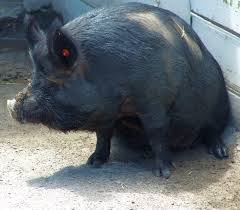Type the name of the breed you're looking for below
[wpdreams_ajaxsearchlite] Don't see the breed your're looking for? Click here and let us know!
Guinea hog
| Place of Origin | United States |
| Origin | The Guinea hog, also called the pineywoods Guinea, Guinea forest hog, acorn eater, and yard pig, is a breed of domestic pig originating in the United States. Despite its name, the breed is not from the country of Guinea, though the foundation stock is thought to be derived from West Africa. |
| Purpose | Meat |
| Characteristics | The Guinea hog is a rare breed with a black coat, sturdy body, curly tail and upright ears. Guinea hogs are small pigs compared to modern breeds; they weigh less than 200 pounds (90 kg)and will yield 50 (23 kg) to 100 (45 kg) pounds of meat and fat. They are good as free-range foragers but are also at home in a farmyard and are reasonably even-temperered.[ The Guinea hog is not used for commercial farming because of its small size and high lard content. There are two types of Guinea hog in North America, small-boned and large-boned Guinea hogs, the latter having longer legs. There is also a type of Guinea hog in South America. |



